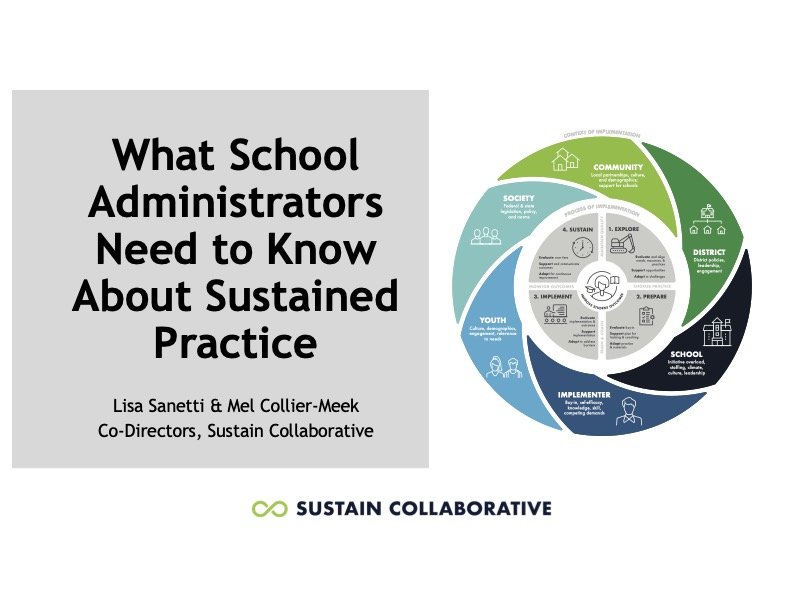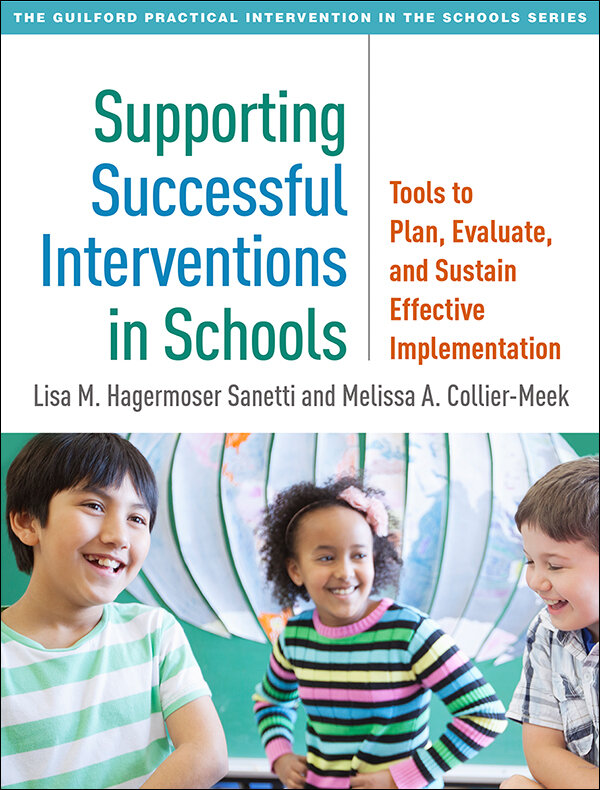
Resources
Read, download, and share resources about sustained practice.
101s for bite-sized chunks of sustained practice basics
Briefs for accessible summaries of sustained practice topics and research
Sustained Practice 101: De-Implementation
De-implementation is a process of removing ineffective practices to make space for sustaining more impactful practices. De implementation is reducing or removing ineffective or unneeded practices. De-implementation allows for resource re-allocation, reduces confusion and mixed messages, and supports student outcomes.
Sustained Practice 101: Giving Feedback
Sustaining practices involves having engaged conversations about what's working and what could be improved. Talking to colleagues about their practice doesn't need to be uncomfortable - the goal is to support, not evaluate!
Sustained Practice 101: Planning & Leading Effective Meetings
Schools hold a lot of meetings to design, evaluate, and revise in student practices. When these meetings are effective, educators are more likely to have practice buy-in, which will support implementation.
Sustained Practice 101: Implementation Climate & Culture
By addressing school climate & culture, school leaders can increase educators' buy-in and support sustained practice.
Sustained Practice 101: Learning Educators’ Beliefs about Practices
What an educator believes about a school-based practice can impact their engagement with it and whether they sustain it over time. Educators' beliefs about practices should be asked about and used for decision-making and support.
Sustained Practice 101: Supporting Self-Efficacy
What is self-efficacy? What does it have to do with sustained practice? How can we help promote educators’ self-efficacy?
Sustained Practice 101: Sustaining Practice while Managing Competing Demands
Teachers have so much to do! Managing competing demands is one of the top barriers to sustained practice. Planning ahead can make the many demands that educators face more manageable and support sustained practice.
Implementing Isn’t Easy (Video)
Implementing with fidelity is no easy task - we can’t assume current practice will improve student outcomes. Most educators - like most people - struggle to integrate a new practice into their existing routines. How can we help educators implement with fidelity? Support teachers. Monitor fidelity.
Sustained Practice 101: Best Practices in Coaching
Coaching can help most educators learn and sustain new practices. It's a critical strategy for facilitating change in schools. But coaching can look very different - and it's not all effective. How it happens and what it entails really matters. Learn more about best practices in coaching for educators here.
Sustained Practice 101: Support the Fit
We can adapt evidence-based practices? Yes - within some limits. Make sure to keep critical components, while adjusting other components to be (a) aligned with the school context, (b) culturally competent for students and families, and (c) feasible for the implementer.
Sustained Practice 101: Focusing on Tier 1
Tier 1 is the general curricula that all students access; having a robust, high-quality Tier 1 (in MTSS) is our best chance to efficiently and effectively support students. We can't set it and forget it - Tier 1 needs to be responsive to students and implemented with fidelity to make a difference.
What do School Administrators Need to Know about Sustained Practice? (Video)
When effective practices are sustained, students achieve better results, more quickly. School administrators can efficiently promote sustain practice by attending to process and context.
Sustained Practice 101: Effective Team Meetings
Teams of educators are responsible for leading and supporting many school initiatives and practices. When team meetings run effectively and efficiently, they can support sustained practice.
Sustained Practice 101: Implementation Climate
What is a positive implementation climate? One in which implementation policies and procedures encourage, cultivate, and reward practice use. Sustaining practices is a school-wide priority and supported through training and resources. Educators are open, adaptable, experienced, and recognized for their work.
Sustained Practice 101: Annual Staff Readiness Review
Staff readiness is about reflecting on whether educators in your school are prepared to sustain practice. Staff readiness needs to be regularly evaluated given ongoing changes.
Sustained Practice 101: Reflection & Planning for Change
When we take the time to reflect on past practices, we are better able to plan for actionable, sustainable change in the future. Change isn't easy! Sustained practices requires continual evaluation, adaption, and support.
What is Sustained Practice?
So, what is sustained practice? A sustained practice is implemented consistently and comprehensively over time. By deliberately supporting sustainment of effective practices, schools can capitalize on current efforts, increase efficiency, and improve student outcomes.
Sustained Practice 101: Multi-Tiered Systems of Support
Multi-tiered systems support (MTSS) is a prevention framework designed to efficiently and effectively support all learners. All students access high-quality, robust curricula (Tier 1), with those at-risk receiving timely, targeted intervention (Tier 2), and students with ongoing needs receiving individualized practices (Tier 3). For MTSS to effectively support students, foundational practices (in Tier 1 & Tier 2) must be implemented with fidelity.
Sustained Practice 101: Individualized Education Programs
Schools are responsible for making sure students in special education actually receive the services, accommodations & modifications outlined in their IEPs. Learn about how to support sustained practice and individualized education programs.
Sustained Practice 101: Supporting Paraeducators
Paraeducators (or paraprofessionals) are critical partners in providing sustained practices to students, especially in special education. There is a mismatch between what we expect from paraeducators and the support they generally receive.
Interested in learning more?
Get notified as we release resources related to sustaining practices in schools.
Evidence-based interventions benefit learners only when they are implemented fully. Yet many educators struggle with successful implementation. This unique book gives practitioners a research-based framework for working with PreK–12 educators to support the effective delivery of academic, behavioral, and social–emotional interventions. Step-by-step procedures are presented for assessing existing implementation efforts and using a menu of support strategies to promote intervention fidelity. In a large-size format for easy photocopying, the book includes 28 reproducible worksheets, strategy guides, and fidelity assessment tools. Purchasers get access to a Web page where they can download and print the reproducible materials.
“Should be a mandatory resource for any professional who provides, supports, or evaluates school-based interventions. Uniquely designed for trainees and practitioners of all levels, this book serves as a step-by-step guide for engaging in best practices associated with measuring, supporting, and evaluating treatment integrity. The valuable downloadable tools can be used repeatedly prior to, during, and following intervention implementation.”
— Matthew DuBois, PhD, NCSP, Department of Psychological Services, Public Schools of Brookline, Massachusetts
“Amid the understandable clamor for evidence-based interventions, the elephant in the room is the conspicuous lack of equal emphasis on supporting effective implementation. This book provides practical concepts and worksheets practitioners can use to put in place any of six strategies to increase fidelity. This book is the missing piece to successful implementation.”
— W. Alan Coulter, PhD, Director, TIERS Group (Teams Intervening Early to Reach all Students), Louisiana State University Health Sciences Center–New Orleans
“This book offers a practical guide to fostering successful implementation of interventions, with the goal of shifting student performance. It is an important contribution for professionals dedicated to putting evidence-based practices in place with integrity. Honoring the complexity of implementation, the book shows how to use feasible, efficient strategies during consultation and coaching to ensure—and sustain—intervention fidelity.”
—Kathleen Lynne Lane, PhD, BCBA-D, Department of Special Education, University of Kansas
“Sanetti and Collier-Meek offer an up-to-date, detailed description of how to provide effective consultation or coaching to implementers, with excellent visuals and helpful worksheets. The book is infused with the latest research on adult behavior change to assist in enhancing implementation of effective practices and troubleshooting common problems.”
—Kent McIntosh, PhD, Department of Special Education and Clinical Sciences, University of Oregon; Co-Director, OSEP Technical Assistance Center on Positive Behavioral Interventions and Supports





















